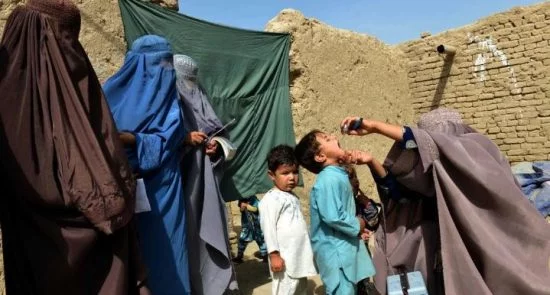Afghanistan, Social November 11, 2018
Short Link:Afghanistan Is the World’s Polio Capital. These Afghans Hope to Fix That
At just 2 years old, Madina had been vaccinated seven times. It was not enough: When she fell ill this fall, a trip to the doctor in Kandahar City confirmed that she was among the latest Afghan toddlers to contract polio.
Ariana news Agency- As reported by New York Times, almost a million children in Kandahar Province alone, like Madina, need at least one dose of oral vaccine a month to head off the disease, health workers say. But many of them also live in the most violent and socially disrupted parts of southern Afghanistan, where the Taliban control large areas and do not want government health workers going door to door.
These realities make a sustained vaccination campaign brutally difficult for health workers here. And Afghanistan, one of three countries where polio is still endemic, is losing ground. Officials have registered 19 cases of polio so far this year, up from 13 each of the previous two years, according to World Health Organization figures.
In August, I followed a polio vaccination crew in Kandahar and saw how, even in areas where health workers have been able to function, many things stand in their way: security fears and drought, deep poverty and stifling tradition, widespread illiteracy and superstition.
Still, starting just after dawn each day, the vaccination teams are at it, hoping to reach just a few more children.
Mawlawi Abdul Rashid of Kandahar City, a religious scholar and member of one team, said most of the residents were poor and desperately worried about what their children would have to eat each night. Drought adds to the daily burden, with families in many neighborhoods having to buy water from tankers after wells dry up.
Given that, Mr. Rashid said, “They don’t care about polio vaccine as much.”
Mohammad Shah, 38, said that as a vaccine campaigner in the city he had been visiting more than 100 houses a day in temperatures reaching 100 degrees Fahrenheit. He said some families asked for food and other necessities instead of the vaccine — a need that Mr. Shah, a father of five, said he understood.
“They keep asking us to bring them wheat, soup and other staples,” he said.
Despite efforts to have religious scholars express support for the vaccine, Mr. Shah said mistrust about it still existed. Many worry about whether strict interpretations of Islam allow the vaccine. Some question its contents and believe conspiracy theories that Westerners have manipulated it to cause infertility.
Abdul Razaq, 65, who was administering the vaccine in the Loya Weyala area of Kandahar City, which is dominated by people displaced by fighting, said around 10 of the 200 families there refused it.
“It’s very difficult to convince those families who reject the vaccine,” he said. “But we try our best.”
Most families here hold traditional views wary of letting outside men enter a home if no male family members are present. For that reason, the health workers try to have at least one woman on each vaccination team. But there are not enough female workers, and all-male teams are frequently turned away.









